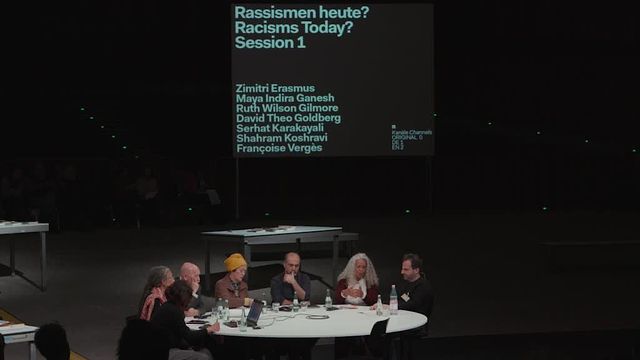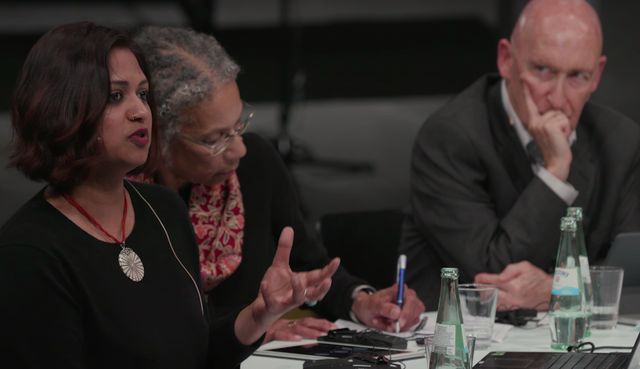Inputs, discussions
Racisms Today?
With Zimitri Erasmus, Maya Indira Ganesh, Ruth Wilson Gilmore, David Theo Goldberg, Serhat Karakayali, Shahram Khosravi, Françoise Vergès

Étienne Balibar and Immanuel Wallerstein’s classic text offers prescient readings and analytic terms for our contemporary symptomologies of race, nation, and class. To what extent do these terms remain relevant today, nearly three decades on? What new racisms—seemingly operating independently of the once dominant biologistic arguments—eclipse past understandings of racism as inequalities are deepened? While the ongoing relevance of social categories of race and class has often been denied, nationalism is on the rise in the face of proliferating demographic and cultural heterogeneities, bodies are individualized, yet inscribed with renewed ethno-racial markings, and whole groups have been “evaporated” by being made stateless. How is racism being reconfigured, as technological developments remake bodies, transform, if not render obsolete large swaths of work and labor or reorganize it across borders, and promote aggressive militarization as well as new surveillance techniques? How is religion being refashioned and repurposed to obscure the workings of race, class, and nation today while rewiring them at the same time? What counter- and critical anti-racisms are being imagined and activated today as key responses to these developments?
Critical race studies scholar David Theo Goldberg and political theorist Françoise Vergès, examine together with sociologist Zimitri Erasmus, feminist data researcher Maya Indira Ganesh, geographer and militant scholar Ruth Wilson Gilmore, the sociologist Serhat Karakayali and anthropologist Shahram Khosravi how Balibar and Wallerstein’s analysis can be applied to contemporary articulations of and resistances to race and racisms across various sites.
Part 1
Thinking through Racisms
After a brief historical overview of the shift in racial formations, structures, and expressions that has been taking place since the late 1970s, the discussants elaborate on how Balibar and Wallerstein’s analysis has impacted their own thinking on racial commitments today: How can current formations of racisms be analyzed? How are the politics of immigration a significant driving element in and of contemporary racisms? How has the history of transnational feminisms of color impacted national feminisms, which have remained largely segregated along racial and class lines? What impacts do digital technology and social media have on contemporary racial articulations? What sorts of anti-racist activism are most effective in facing down contemporary racisms?
Part 2
Speaking to Racial Conditions Today
Participants and the audience will engage in an analysis of a curated set of stills and multimedia images that are both demonstrative and critical of contemporary racist expressions across a range of national contexts: What are racial conditions today and how do these materials relate to manifestations of it?
Program in collaboration with David Theo Goldberg, Francoise Vergès
Short biographies: Zimitri Erasmus, Maya Indira Ganesh, Ruth Wilson Gilmore, David Theo Goldberg, Serhat Karakayali, Shahram Khosravi, Françoise Vergès


